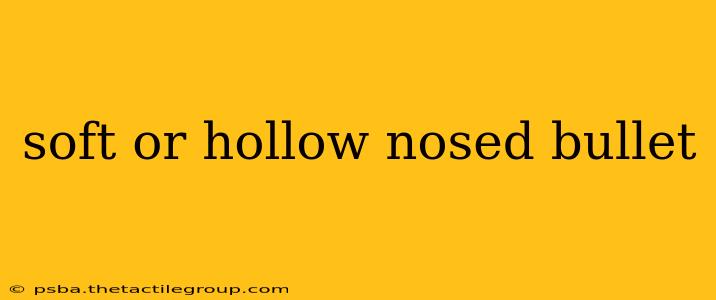Choosing the right ammunition is crucial for any firearm owner, whether for hunting, self-defense, or target practice. Two popular bullet types often top the list: soft point and hollow point. While both are designed for expansion upon impact, understanding their differences is key to selecting the best option for your specific needs. This detailed guide will explore the characteristics, applications, and advantages and disadvantages of each type.
Understanding Bullet Construction and Function
Before delving into the specifics of soft point and hollow point bullets, it's important to grasp the fundamental principles of bullet design. The primary goal is controlled expansion upon impact, maximizing energy transfer to the target and minimizing overpenetration. This is achieved through various techniques influencing the bullet's jacket and core.
The Role of the Jacket and Core
Most bullets consist of a metal jacket surrounding a core. The jacket material, typically copper or lead alloys, provides structural integrity and stability during flight. The core material can vary; lead is common, but other materials like copper or a lead-tin alloy are used in specialized rounds. The interaction between the jacket and core determines the bullet's expansion characteristics.
Soft Point Bullets: A Classic Choice
Soft point bullets feature a partially exposed lead core at the tip. This exposed lead is softer than the jacket, making it more prone to deformation upon impact. The exposed lead facilitates expansion, increasing the bullet's diameter and transferring more energy to the target.
Advantages of Soft Point Bullets:
- Reliable Expansion: Soft point bullets generally offer dependable expansion, even at lower velocities.
- Controlled Expansion: They often provide a balance between expansion and penetration, making them suitable for various applications.
- Cost-Effective: Compared to hollow points, soft points are typically less expensive.
- Suitable for Hunting: Their controlled expansion makes them a popular choice for hunting medium-sized game.
Disadvantages of Soft Point Bullets:
- Less Expansion than Hollow Points: They may not expand as dramatically as hollow points, potentially leading to less stopping power in self-defense situations.
- Potential for Fragmentation: In some cases, soft point bullets might fragment upon impact, which can be unpredictable.
Hollow Point Bullets: Designed for Expansion
Hollow point bullets feature a cavity at the tip, which significantly enhances expansion upon impact. This cavity allows the bullet to mushroom or deform more readily, increasing its diameter and transferring more energy. The design variations within hollow point bullets are numerous, each influencing expansion characteristics.
Advantages of Hollow Point Bullets:
- Superior Expansion: They are renowned for their significant expansion, creating a larger wound cavity and increasing stopping power.
- Reduced Overpenetration: The rapid expansion reduces the risk of overpenetration, making them safer for self-defense situations in populated areas.
- Optimal for Self-Defense: Their stopping power makes them a preferred choice for self-defense ammunition.
Disadvantages of Hollow Point Bullets:
- Cost: Hollow points generally cost more than soft points.
- Sensitivity to Obstructions: The hollow point design can be more sensitive to obstructions, potentially affecting expansion performance.
- Potential for Jamming (in some cases): The hollow point cavity can sometimes increase the risk of jamming in certain firearms, although modern designs significantly mitigate this.
Choosing Between Soft Point and Hollow Point: A Practical Guide
The choice between soft point and hollow point ammunition depends heavily on your intended use:
- Hunting: Soft points are often suitable for hunting medium-sized game, offering a balance between expansion and penetration. For larger game, heavier bullets might be necessary.
- Self-Defense: Hollow points are generally preferred for self-defense due to their superior expansion and reduced overpenetration risk.
- Target Practice: Both soft points and hollow points can be used for target practice, but the choice often comes down to cost and personal preference.
Disclaimer: Always consult your firearm's manual and local laws regarding ammunition before purchasing or using any type of bullet. Safe firearm handling practices are essential. This information is for educational purposes only and does not constitute professional advice.

